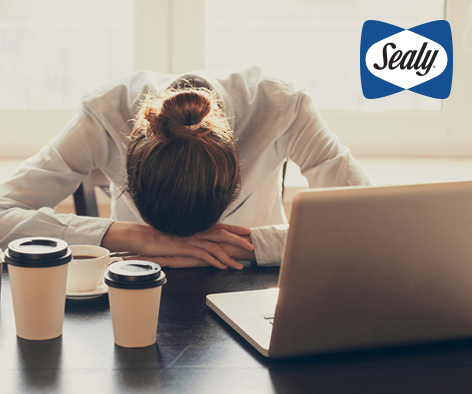- Vast-majority of hospitality workers are sleep deprived, and it’s negatively impacting on their jobs
- Hospitality is the MOST sleep deprived profession in the UK
- Bed manufacturer Sealy is calling for employers to put sleep at the top of their agenda
- Online HR resource available at www.sealy.co.uk
Alarming new research from bed manufacturer Sealy UK, has revealed the nation’s hospitality workers are turning up for work sleep deprived – impacting not only on their productivity and mood, but even their safety. It is now spearheading a major initiative, appealing to bosses to take this often-overlooked issue more seriously.
The awareness campaign is based on data from Sealy’s recent Worldwide Sleep Census, which questioned 5,000 people of a working age from across the UK, revealing a staggering 86% of hospitality workers admitted they could function better at work if they slept better.
This places the sector as the most sleep-deprived profession in the UK, coming above even banking (79%), as well as construction, retail and transport.
It appears this ongoing sleep deprivation is causing some serious issues in the working week; 65% of hospitality workers regularly lose their temper or have been irritable to a colleague, 30% claim they suffer a lack of productivity, while 19% say they’re often late into work or have time off as a result.
A shocking 1-in-25 even admitted falling asleep whilst at work. However, perhaps most worrying is the 11% of hospitality staff who have had a recent accident at work – such as a trip or a slip, due to feeling tired.
A call for bosses to put sleep at the top of their agenda
Despite the popularity of ‘wellness’ perks at companies across the UK, from gym memberships to medical insurance and even free healthy snacks, sleep remains something that is often overlooked by employers, and not treated as an important issue. This happens despite the potentially serious impact of staff not achieving adequate rest, as demonstrated in the study.
Neil Robinson, an expert on sleep at Sealy, comments: “Lack of sleep – and the subsequent fallout the next day – can be caused by a wide range of legitimate medical conditions, from stress, to mental health problems or respiratory disease. Even at the less severe end of the spectrum, there’s usually an underlying health issue causing sleeplessness. However, it’s often treated as an incidental issue by bosses, with a ‘pull yourself together’ attitude. This is not helpful for employees, especially when there are some potentially severe consequences of turning up exhausted.
“There are of course occasions when staff are tired as a result of staying up too late or burning the candle at both ends. However, this campaign is about helping bosses make that distinction, as well as encouraging a common-sense approach to effectively managing sleep in the workplace”.
To address this important issue, Sealy is working with a leading HR expert, Kate Russell, of Russell HR Consulting – a firm advising companies of all sizes across the UK when it comes to best-practice HR policy – to produce a ‘common sense’ guide for bosses to better manage sleep deprivation of staff.
Visit www.sealy.co.uk/deeper-sleep/the-elephant-in-the-office/ for more details of the campaign.

